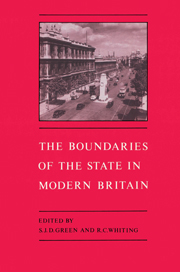Book contents
- Frontmatter
- Contents
- List of figures
- List of tables
- List of contributors
- Acknowledgements
- 1 Introduction: the shifting boundaries of the state in modern Britain
- Part I The state and political theory
- Part II The economy
- Part III Welfare and social policy
- 9 The dilemmas of welfare: Titmuss, Murray and Mead
- 10 Medicine and the English state, 1901–1948
- 11 The English state and educational theory
- Part IV Conflict and order
- Part V Religion and morality
- Index
11 - The English state and educational theory
Published online by Cambridge University Press: 18 March 2010
- Frontmatter
- Contents
- List of figures
- List of tables
- List of contributors
- Acknowledgements
- 1 Introduction: the shifting boundaries of the state in modern Britain
- Part I The state and political theory
- Part II The economy
- Part III Welfare and social policy
- 9 The dilemmas of welfare: Titmuss, Murray and Mead
- 10 Medicine and the English state, 1901–1948
- 11 The English state and educational theory
- Part IV Conflict and order
- Part V Religion and morality
- Index
Summary
Over the last couple of centuries advanced European states have all adopted similar approaches to the issue of human capital. They have all created mass educational systems, with compulsory schooling, core curricula and national examinations; and, to ease the introduction of such massive innovations, they have all employed a small army of educational experts equipped with more or less sophisticated educational theories. All, that is, except England.
The English state was peculiarly reluctant to intervene in the educational market place. In Culture and Anarchy Matthew Arnold pointed out that the individualistic English have always had trouble with such a Prussian-sounding concept as the state:
We have no notion, so familiar on the continent and to antiquity, of the State – the nation in its collective and corporate character, entrusted with stringent powers for the general advantage in the name of an interest wider than that of individuals.
The State (such as it was) displayed much less interest in organised teaching than its rivals on the continent. Elementary education was not compulsory in most areas of the country until the 1880s. A national educational authority was only created in 1899. State grammar schools were not created until 1902 – exactly a century after Napoleon created the state lycee. The Prussians introduced compulsory school attendance until 14 in 1826: the English waited until 1921.
Throughout much of the century education has been the joker in the ministerial pack. When Eustace Percy first moved to the Board of Education in 1924 a well-wisher said to him: ‘My dear boy, I am very glad to see you in this position.
- Type
- Chapter
- Information
- The Boundaries of the State in Modern Britain , pp. 231 - 258Publisher: Cambridge University PressPrint publication year: 1996
- 2
- Cited by



